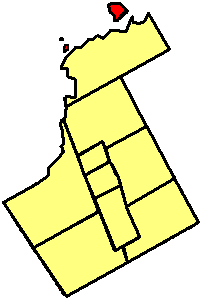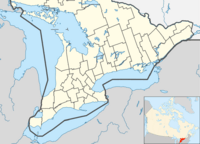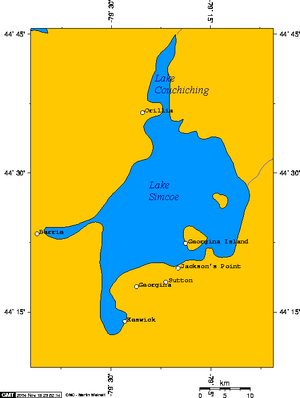Chippewas of Georgina Island First Nation facts for kids
Quick facts for kids
Chippewas of Georgina Island First Nation
Waaseyaagmiing Anishinaabek
|
|
|---|---|
| Chippewas of Georgina Island First Nation Indian Reserve | |
| Country | |
| Province | |
| Regional municipality | York |
| First Nation | Chippewas of Georgina Island |
| Area | |
| • Land | 14.55 km2 (5.62 sq mi) |
| Population
(2020)
|
|
| • Total | 923 |
| • Density | 18.9/km2 (49/sq mi) |
| Website | georginaisland.com |

The Chippewas of Georgina Island First Nation (also called Ojibwe: Waaseyaagmiing Anishinaabek) are a group of Ojibwe people. The Ojibwe are also known as Anishinaabeg. They live on Georgina Island in Lake Simcoe, Ontario, Canada.
In 2008, there were 666 registered members of the First Nation. About 181 people lived on their Indian reserve, and 485 lived outside of it. By 2020, the total number of members grew to 923. This First Nation is one of the few located near the big city of Toronto.
Contents
Where is Georgina Island First Nation?
The First Nation has three special land areas called reserves. These are the Chippewas of Georgina Island First Nation Indian Reserve, the Chippewas of Georgina Island First Nation 33A Indian Reserve 44°20′N 79°17′W / 44.333°N 79.283°W, and the shared Chippewa Island Indian Reserve.
Main Reserve Islands
The main reserve includes a small piece of land near Virginia Beach. It also includes three islands in the southern part of Lake Simcoe:
- Georgina Island
- Snake Island
- Fox Island
Other Reserve Lands
The Chippewas of Georgina Island First Nation 33A reserve is a small piece of land. It is about 1.3 hectares (3.2 acres) in size. This land is separate from the main reserve by a road and some private properties.
The Chippewa Island reserve is 3.1 hectares (7.7 acres) large. It has two islands near the Moose Deer Point First Nation. This area is in Twelve Mile Bay of Georgian Bay. The Chippewas of Georgina Island share this reserve with the Chippewas of Rama First Nation and the Beausoleil First Nation.
How the Community is Run
The Georgina Island reserve is governed by a council. This council has five members. There is a Chief and four councillors who help make decisions for the community.
Emergency Services
The community has its own fire and emergency services. They have one fire truck and one ambulance. The department has two full-time firefighters, including the chief. There are also volunteer responders who help out.
Policing Services
The Georgina Island Police Service keeps the community safe. They get help from the Ontario Provincial Police when needed. This police force has three officers. They took over from the Royal Canadian Mounted Police in 1978. The Georgina Island Police Service is part of the First Nations Police Service.
Getting Around
To get to Georgina Island, people usually travel by boat from the mainland. There is a marina at the southern tip of the island. This is where the ferry and smaller boats dock.
Ferry and Winter Travel
The ferry, named Aazhaawe, was built in 1999. It can carry up to 18 cars and 50 passengers. The ferry runs during certain seasons. It does not run when Lake Simcoe is frozen in winter. During winter, fan boats are used to get to Georgina, Fox, and Snake islands. The Georgina Water Taxi's Ahneen boat also offers rides to Georgina Island.
Roads on the Islands
Georgina Island has a few paved roads, nine in total. Residents use their own cars to get around. Snake Island only has unpaved roads. Fox Island does not have any roads at all. People usually use boats to reach Fox and Snake Islands, docking at private docks. The roads on the islands are taken care of by the First Nation band. There are no airports or heliports on any of the islands.
Community Jobs
The main jobs on the reserve are related to the First Nation government itself. Other jobs are often linked to tourism on the island. The island has a driving range, a bed and breakfast, and marina facilities. These businesses help bring visitors and create jobs.
Learning and Education
Younger students, from kindergarten to Grade 6, go to a school on Georgina Island. This school is called Waabgon Gamig. The York Region District School Board (YRDSB) helps with staff and support for the school. Students from Grade 6 to Grade 12 need to go to schools on the mainland. The YRDSB also helps these students.
Health Services
Basic health care is available at the Georgina Island Health Building. Local staff work there. Medical staff from York Region also visit to provide care.
See also
 | Laphonza Butler |
 | Daisy Bates |
 | Elizabeth Piper Ensley |



